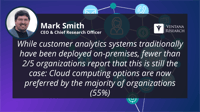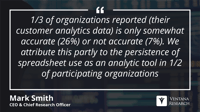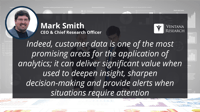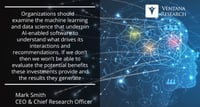The annual Ventana Research Digital Innovation Awards showcase advances in the productivity and potential of business applications, as well as technology that contributes significantly to the improved processes and performance of an organization. Our goal is to recognize technology and vendors that have introduced noteworthy digital innovations to advance business and IT.
Read More
Topics:
Sales,
Customer Experience,
Human Capital Management,
Marketing,
Office of Finance,
Voice of the Customer,
Continuous Planning,
embedded analytics,
Learning Management,
Analytics,
Business Intelligence,
Collaboration,
Data Governance,
Data Preparation,
Information Management,
Internet of Things,
Business Planning,
Contact Center,
Data,
Product Information Management,
Sales Performance Management,
Workforce Management,
Financial Performance Management,
Price and Revenue Management,
Digital Technology,
Digital Marketing,
Digital Commerce,
Operations & Supply Chain,
Enterprise Resource Planning,
ERP and Continuous Accounting,
Revenue,
blockchain,
natural language processing,
data lakes,
Total Compensation Management,
robotic finance,
Predictive Planning,
employee experience,
candidate engagement,
Conversational Computing,
Continuous Payroll,
collaborative computing,
mobile computing,
continuous supply chain,
Subscription Management,
agent management,
extended reality,
intelligent marketing,
sales enablement,
work experience management,
lease and tax accounting,
AI & Machine Learning,
robotic automation
The annual Ventana Research Digital Innovation Awards showcases advances in the productivity and potential of business applications, as well as technology that contributes significantly to improved efficiency and productivity in the processes and the performance of an organization. Our goal is to recognize technology and vendors that have introduced noteworthy digital innovations that advance business and IT.
Read More
Topics:
Analytics,
Collaboration,
Data Governance,
Data Lake,
Data Preparation,
Internet of Things,
Data,
Information Management (IM),
Digital Technology,
blockchain,
Conversational Computing,
collaborative computing,
mobile computing,
extended reality,
AI & Machine Learning
Supercharging the customer experience (CX) is more than just an opportunity. It’s essential for every organization that looks to optimize engagement at every moment of the customer journey. In times such as these, when business continuity is a top priority, organizations must address the customer experience, especially if it has not been a focal point of the executive team.
Read More
Topics:
Sales,
Customer Experience,
Human Capital Management,
Marketing,
Office of Finance,
Voice of the Customer,
Analytics,
Collaboration,
Data Governance,
Data Preparation,
Information Management,
Internet of Things,
Contact Center,
Data,
Digital Technology,
Digital Commerce,
Operations & Supply Chain,
Intelligent CX,
Conversational Computing
For interactions with customers to go well, organizations must manage an ever-increasing array of engagement channels. Our research finds that organizations expect to see interaction volumes increase on all channels, especially digital ones such as text-based messaging, chat, mobile and social apps. Unfortunately, the systems that manage these channels are typically disparate and uncoordinated and may not use the same underlying technology. This makes it difficult for organizations to...
Read More
Topics:
Customer Experience,
Voice of the Customer,
business intelligence,
embedded analytics,
Analytics,
Collaboration,
Data Governance,
Data Preparation,
Information Management,
Internet of Things,
Contact Center,
Data,
Digital Technology,
Digital Commerce,
blockchain,
natural language processing,
data lakes,
Intelligent CX,
Subscription Management,
agent management,
extended reality,
AI & Machine Learning
Using customer analytics effectively involves several challenges. Organizations must make it a business priority, cultivate leadership and set a course for ensuring data and analytics are being processed and governed effectively. But effectiveness also requires technology that will assist in the effective operations and management of customers and help an organization achieve its goals.
Read More
Topics:
Customer Experience,
Voice of the Customer,
business intelligence,
embedded analytics,
Analytics,
Collaboration,
Data Governance,
Data Preparation,
Information Management,
Contact Center,
Data,
Digital Technology,
Digital Commerce,
blockchain,
natural language processing,
data lakes,
Intelligent CX,
Conversational Computing,
collaborative computing,
mobile computing,
Subscription Management,
agent management,
extended reality,
AI & Machine Learning
Customer analytics have never been more important, but effectively creating and managing them is not easy. The data that’s required to achieve visibility into all customer activity involves many applications and systems and it’s a challenge to ensure the data used is accurate and consistent. Even once data is assembled, organizations often struggle to apply analytics to create the metrics that best represent an understanding of the past and, more importantly, the path to the future.
Read More
Topics:
Customer Experience,
Voice of the Customer,
embedded analytics,
Analytics,
Business Intelligence,
Collaboration,
Data Governance,
Data Preparation,
Information Management,
Contact Center,
Data,
Digital Technology,
Digital Commerce,
blockchain,
natural language processing,
data lakes,
Intelligent CX,
Conversational Computing,
collaborative computing,
Subscription Management,
agent management,
extended reality,
AI & Machine Learning
Today’s intense competition requires that companies know as much as they can about their customers in order to anticipate their needs and deliver a superior customer experience. However, many organizations struggle to do this well. Implementing initiatives to improve customer value across any department or process involving customers requires both in-depth visibility into current operations and excellent metrics.
Read More
Topics:
Customer Experience,
Voice of the Customer,
business intelligence,
embedded analytics,
Analytics,
Collaboration,
Data Governance,
Data Preparation,
Information Management,
Internet of Things,
Contact Center,
Data,
Digital Technology,
Digital Commerce,
blockchain,
natural language processing,
data lakes,
Intelligent CX,
Conversational Computing,
collaborative computing,
mobile computing,
Subscription Management,
agent management,
extended reality,
AI & Machine Learning
Having effective analytics enables businesses to understand far better than ever before the data they’re collecting, and to do so in greater volumes and more forms. These new capabilities are especially relevant to sales organizations. When applied to sales data, analytics can help sales teams achieve quotas and forecast more consistently, as well as understand the impacts of incentives and maximize the potential of territories, all of which help improve sales performance. These benefits...
Read More
Topics:
Customer Experience,
Voice of the Customer,
embedded analytics,
Analytics,
Business Intelligence,
Collaboration,
Data Governance,
Data Preparation,
Internet of Things,
Contact Center,
Data,
Information Management (IM),
Digital Technology,
Digital Commerce,
blockchain,
natural language processing,
data lakes,
Intelligent CX,
Subscription Management,
agent management,
AI & Machine Learning
We now are well beyond the year depicted in 2001: A Space Odyssey, a cinematic perspective on the future of artificial intelligence in which HAL 9000, a computer, is able to simulate human behavior and control machines. Anyone reviewing the past two years of marketing around AI in the business technology industry can be forgiven for believing that we have arrived at the futuristic state Stanley Kubrick imagined. We have not.
Read More
Topics:
Big Data,
Data Science,
Mobile,
Customer Analytics,
Customer Engagement,
Customer Experience,
Machine Learning,
Mobile Technology,
Wearable Computing,
business intelligence,
Analytics,
Cloud Computing,
Collaboration,
Customer Service,
Data Governance,
Data Integration,
Data Preparation,
Internet of Things,
Contact Center,
Information Optimization,
Digital Technology,
Machine Learning and Cognitive Computing,
Cybersecurity,
Billing and Recurring Revenue,
Workforce Optimization,
collaboration for business
We are have arrived at the May 25, 2018 date when the European Union’s General Data Privacy Regulations (GDPR) become enforceable, following what has been a two-year transition period. Companies were given this time to put in place reasonable measures and the systems necessary to support the legislation’s wide-ranging personal data privacy requirements, which apply to any organization with more than 250 employees that serves EU citizens. While this regulation will apply in the EU, it has...
Read More
Topics:
Big Data,
Data Science,
Mobile,
Sales,
Customer Analytics,
Customer Engagement,
Customer Experience,
Marketing,
Analytics,
Business Intelligence,
Cloud Computing,
Collaboration,
Data Governance,
Data Integration,
Data Preparation,
Internet of Things,
Contact Center,
Digital Technology,
Digital Marketing,
Digital Commerce,
Cybersecurity,
Billing and Recurring Revenue,
collaboration for business,
mobile marketing



















